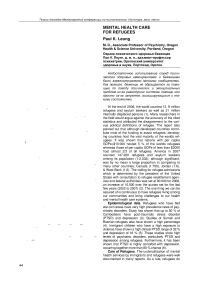Mental health care for refugees
Автор: Leung Paul K.
Журнал: Сибирский вестник психиатрии и наркологии @svpin
Рубрика: Тезисы докладов международной конференции по психоонкологии "Культура, мозг, тело"
Статья в выпуске: 3 (50), 2008 года.
Бесплатный доступ
Короткий адрес: https://sciup.org/142100751
IDR: 142100751
Текст статьи Mental health care for refugees
Недостаточное использование служб психического здоровья иммигрантами и беженцами было зарегистрировано многими сообщениями. Как правило, беженцы не обращаются за помощью по поводу психических и эмоциональных проблем из-за равнодушия системы помощи или просто из-за запретов, ассоциирующихся с такими состояниями.
i
Epidemiological data . Refugees who have fled war-torn areas have very high prevalence rates of psychiatric disorders. Study has shown that up to 50 % of Cambodians have post-traumatic stress disorder (PTSD) and depression (3). Studies of Somali and Bosnian refugees also have shown a high percentage (4). Immigrant children who have a high exposure to violence have shown a high clinical PTSD range of 32 % and depression of 16 % (5). These studies show high levels of psychiatric disorders, particularly PTSD and depression among refugees. Furthermore, it has been shown that PTSD is highly comorbid with depression, occurring together more than 80 % chance (6).
The Intercultural Psychiatric Program (IPP) of Oregon Health & Science University (OHSU) has strived to best itself in providing cares to the immigrant and refugee communities in Oregon since its existence in 1978. The clinic is now caring for more than 1 250 patients with clinicians capable of 16 languages. IPP has utilized a psychiatrist-mental health clinician pairing model to provide services to a group of patients;
There are many challenges existing besides the clinical nature of caring for people experienced severe traumas and great deal of losses. Funding remains the biggest challenge for any organization in the United States focus on care for refugees particularly in providing health or mental health cares. There is no free care in America. At the end of the day running a treatment program is nothing but running a business, the bottom line counts. The ability to work with payor(s) of cares requires professional knowledge and experiences as well as the need to cultivate and maintain on-going working relationship which are often neglect by medical professionals mostly dominate the leadership roles in the organiza- tion. It is equally challenging to secure funding for the refugee individual to get medical and mental health cares. Americas refugee resettlement process favors the self-sufficient model that the refugee person only gets public financial assistance for the first 9-12 months and is expected to self support by fully employed afterward. M


